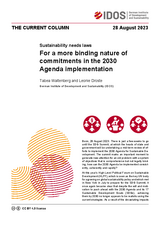Sustainability needs laws
For a more binding nature of commitments in the 2030 Agenda implementation
Waltenberg, Tabea / Leonie DrosteThe Current Column (2023)
Bonn: German Institute of Development and Sustainability (IDOS), The Current Column of 28 August 2023
Bonn, 28 August 2023. There are just a few weeks to go until the SDG Summit, at which the heads of state and government will be undertaking a mid-term review of efforts to implement the 2030 Agenda for Sustainable Development. The summit marks an important moment to generate new attention for an old problem: with a system of objectives that is comprehensive but not legally binding, how can the 2030 Agenda be implemented consistently, coherently and rapidly?
At this year’s High-Level Political Forum on Sustainable Development (HLPF), which is seen as the key UN body for agreeing on global sustainability policy and which met in New York in July to prepare for the SDG Summit, it once again became clear that despite the will and motivation to push ahead with the 2030 Agenda and its 17 Sustainable Development Goals (SDGs), achieving them by 2030 no longer appears to be realistic using the current strategies. As a result of the devastating impacts of global crises such as the COVID-19 pandemic, Russia’s war of aggression against Ukraine and the increasing frequency of natural disasters due to climate change, the sustainability agenda is at risk of losing relevance. New and exacerbated conflicts in the objectives and dwindling public budgets are creating additional obstacles to accelerated implementation, as a result of which progress “on more than 50 per cent of targets of the SDGs is weak and insufficient; on 30 per cent, it has stalled or gone into reverse.” A number of transformative measures are needed to effect change: huge investments in SDG financing, greater mobilisation of the private sector and better mainstreaming of the 2030 Agenda in public discourse. Especially in view of limited financial resources, however, a more regulatory approach involving legislation and regulation is acquiring new significance: even though the very existence of the 2030 Agenda as a joint steering instrument can certainly be seen as a success in view of the complex conflicts of interest at a multilateral level, the agenda needs to act as a framework throughout the world through legally binding norms and laws in order to accelerate its implementation.
While at international level an instrument that is legally binding across the globe is already being negotiated to protect human rights in global value chains, for example, and the European Union has drawn up a taxonomy for sustainable investments and has adopted a regulation on deforestation-free supply chains, ambitious initiatives are needed at national level, too. As a high-income country, Germany causes a considerable amount of negative environmental and social spillover effects and ought to set a good example here – with a view both to the creation of new laws and their implementation.
Germany’s government coalition has set itself the goal of making the SDGs more binding in concrete government action and in law-making. The coalition agreement itself contains a number of important projects, such as a revision of the Federal Soil Protection Act and the incorporation of children’s rights into the German Basic Law. Nevertheless, it is striking that many laws have yet to be realised, particularly with regard to environmental sustainability. Now in particular, halfway through the government coalition’s term, it should seize the opportunity to focus on these laws, because the success of this government will be judged not least by the extent to which it fulfils its promises. This will require political will and a focus on the long term, striking a balance between conflicting goals, resolving implementation conflicts and promoting a strong civil society.
One specific initiative that offers the potential for enshrining a higher level of sustainability in law in Germany is a recommendation that envisages a resource conservation act being passed in the form of a new original law. An act of this kind would enshrine targets specific to individual groups of substances and overarching, concrete resource conservation objectives in law and would be comparable to Germany’s existing Federal Climate Change Act. As shown by the recently published criticism of the German Government’s Climate Action Programme voiced by the Council of Experts on Climate Change, however, these laws can only really be implemented with a high level of ambition, stable data and a consistent framework of measures.
Another aspect that goes beyond the existing sustainability impact assessment of draft legislation and that is becoming increasingly important throughout the world is the recognition of nature as a legal subject, as has been the case in New Zealand since 2010. Back in 2008, Ecuador became the first country in the world to recognise the rights of nature in its constitution. Through peer learning, these decisions prompted a number of other bills and court cases. In contrast to businesses, nature is not (yet) considered a legal subject here in Germany, yet recognition of the rights of nature would be an important step to help achieve environmental goals more effectively.
Alongside a lack of political will, adequate financing and powerful stakeholder groups, the non-binding nature of the 2030 Agenda remains a considerable challenge with regard to the lack of speed in its implementation. This, too, is one of the reasons why the international community has only implemented a fraction of the goals by the halfway mark of the implementation period. Especially now during the weeks between the HLPF and the SDG Summit, attention ought to be devoted to this obstacle again. Particularly in view of the rapidly closing window of opportunity, new laws on sustainability could generate new impetus to accelerate implementation – something that is absolutely essential.



